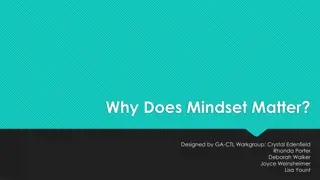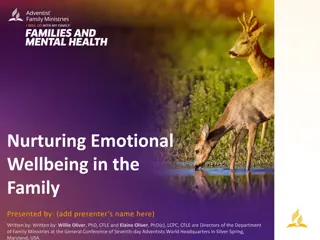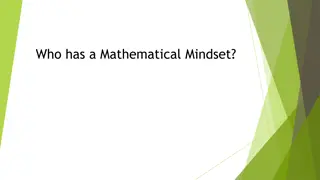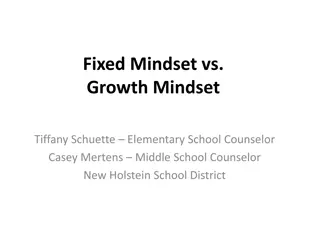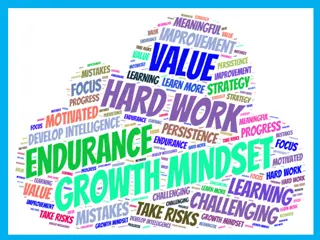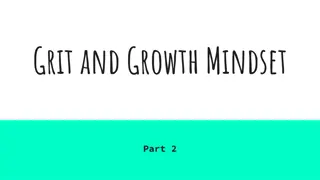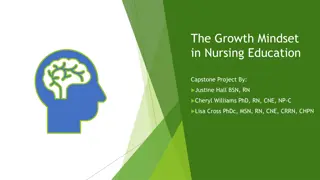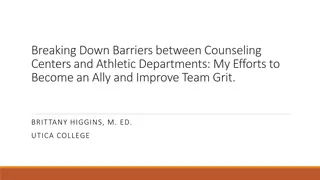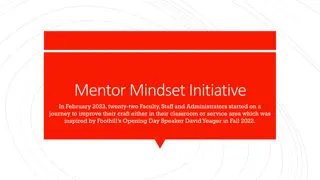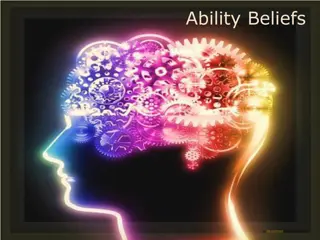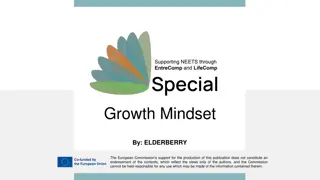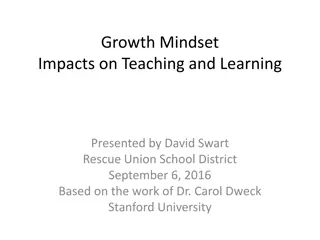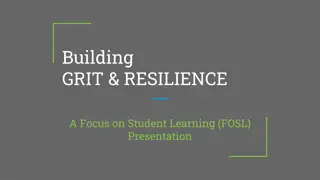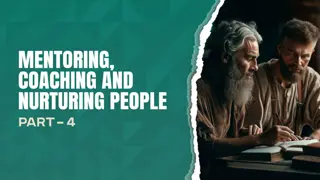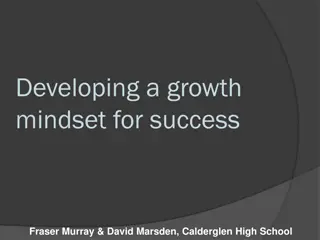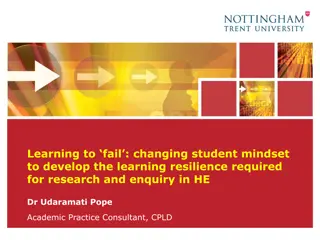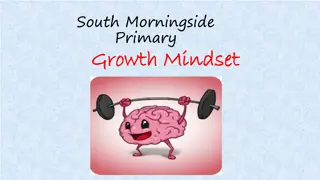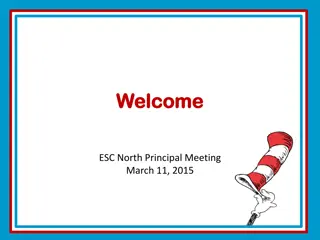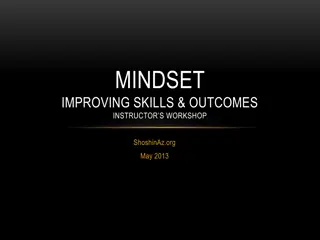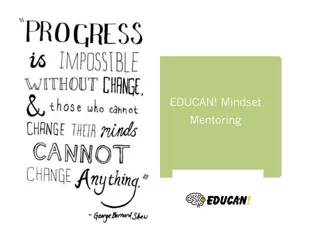Nurturing Growth Mindset and Study Skills
The content discusses the importance of fostering a growth mindset and study skills among students to enhance learning and academic performance. It highlights the brain's neuroplasticity in adolescence, the benefits of a growth mindset, and practical tips for parents to support their children's intellectual development and success in school.
Download Presentation

Please find below an Image/Link to download the presentation.
The content on the website is provided AS IS for your information and personal use only. It may not be sold, licensed, or shared on other websites without obtaining consent from the author.If you encounter any issues during the download, it is possible that the publisher has removed the file from their server.
You are allowed to download the files provided on this website for personal or commercial use, subject to the condition that they are used lawfully. All files are the property of their respective owners.
The content on the website is provided AS IS for your information and personal use only. It may not be sold, licensed, or shared on other websites without obtaining consent from the author.
E N D
Presentation Transcript
Growth Mindset & Study Skills
Introductions Our GEAR UP Team includes:
oWhen we say college, we mean any type of education or training after high school. We also use the terms postsecondary education and postsecondary training . oThere are many options for students after high school, including apprenticeships, military, on-the- job training programs, community college certificates, two-year degrees, and four-year degrees. oThe term college includes all of these things. What do we mean when we say college?
The brains prefrontal cortex, which functions as the control center for executive functions such as planning, goal setting, decision making, and problem solving, undergoes significant changes during the teenage years. Thanks to the wonders of neuroplasticity, adolescents are primed to improve their performance in school and beyond. Here s how to help. The teenage brain is wired to learn!
Intelligence is like a muscle: the brain changes based on one s experiences and efforts. A growth mindset means that intellect and talent are not determined at birth or set in stone. They can be developed through dedication and hard work. Students show greater motivation, better grades, and higher test scores when they understand that through hard work, they can develop and improve their intelligence and abilities. Growth mindset
Fixed vs Growth
Praise carefully not for intelligence but for effort. Encourage practice and effort. Encourage child to challenge themselves to grow those brain cells! Discuss errors and mistakes and help your children to see them as opportunities to learn and improve. Key points for families
It grows stronger with challenges. Success in school is largely determined by the learning strategies students use not by some innate talent. Students can learn and improve effective problem- solving and study skills to be successful. The brain is like a muscle
Eat, exercise, and sleep. Physical activity aids in memory. Hunger and lack of sleep can negatively affect your grades. Have a dedicated study area. Try for a well-lit, organized workspace with few distractions. Get organized. Have a section for each subject. Label and date papers. Study skills basics Ask for help. Don t wait until you are failing. Reach out to teachers or GEAR UP staff to take advantage of tutoring. Study in chunked sessions. Your ability to retain information diminishes after about 25-30 minutes, so break it up into multiple, smaller sessions. Reward yourself with fun activities during your breaks. Discover what works best for you and your learning style.
Use study groups or study buddies. Listen to audiobooks. Read out loud. Talk things out to gain better understanding. Auditory learner
Use images or diagrams to display information. Read handouts. Create mental pictures. Take detailed written notes from textbooks and in class. Visual learner
Works best in hands-on learning settings. Likes to physically manipulate something to learn about it. Move about and handle things. Works well with lab components. Have an actual object in hands. Tactile or kinesthetic learner
Block off time to study. Make a weekly or daily to do list. Use a calendar/planner. Get up early to get stuff done. Prioritize and schedule what you need to do be realistic! Make or join a study group. Time management
Use the Cornell Notetaking System. If you're more of a visual person, try writing notes using different colored pens. Create your own abbreviations. Write down any ideas that the teacher repeats or says is important. Write down examples. Rewrite your notes after class. It can help you remember the material better. Note-taking
Be an active reader. Think about what you are reading. Search for cues about the most important content. Read more than once. Summarize in your own words. Don t put off reading assignments until the last minute. Read and understand captions and figures. Pay attention to key concepts and end of chapter reviews. Reading
Make flashcards. Rewrite/re-read your notes; reorganize into categories. Get help if you need it: use tutoring or a study group. Don t cram! Know the test format. Get all of your questions answered. Test Preparation
Verbalize what you know If you can teach it to someone else, you have a solid grasp on the material. Use chunking. Most of us are able to store only about four to seven different items in our short-term memory (Think about phone numbers). Chunking involves creating something more meaningful and therefore memorable from seemingly random bits of information. Other memory tips Say it out loud/write it down. Use song or jingles. Expression or word mnemonics-take the first letter of each word to form a sentence.
How GEAR UP can help Insert services offered at your school such as homework help
Contact information: [insert counselor/advisor/mentor name] Phone: (xxx) xxx-xxxx E-mail: xxxx@xxxx.xxx Thanks for coming
Topic Next Family Night Date


